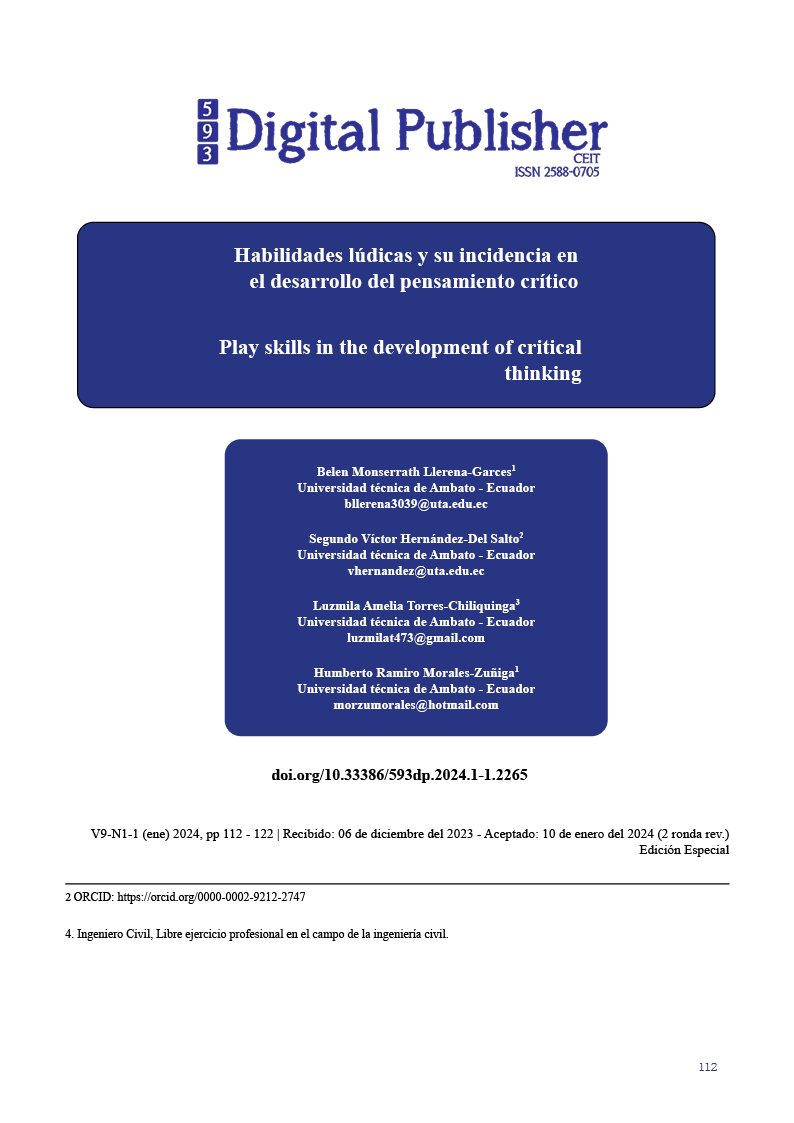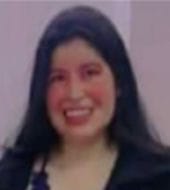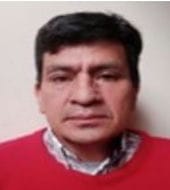Play skills in the development of critical thinking
Main Article Content
Abstract
The present research deals with playful skills in the development of critical thinking, thus to the playful activity as that which can be performed in free time, its objective is to release tensions, get out of the daily routine and get some pleasure, fun and entertainment; the application of playful skills will facilitate the development of critical thinking in students, which will be reflected in school academic performance and the social environment where it develops.
The methodology applied in this research is qualitative since it is based on the collection of data obtained previously and can be analyzed in a way that allows a solution to the problem given in this case, resulting in the application of various strategies that can be applied and that allow the development of critical thinking, in addition to the students will improve their academic performance.
In such a way it is concluded that the Playful Skills play a very important role when it comes to arouse interest in children, they serve to start a class, to explain a new topic or to evaluate some acquired competence, taking into account that the interest of children in learning is a very fragile good, it is obtained very easily but it is also lost and then it is practically impossible to recover it since acquiring knowledge demands a great effort of will and that many times children do not know what is the purpose and reason for their learning.
Downloads
Article Details

This work is licensed under a Creative Commons Attribution-NonCommercial-ShareAlike 4.0 International License.
1. Derechos de autor
Las obras que se publican en 593 Digital Publisher CEIT están sujetas a los siguientes términos:
1.1. 593 Digital Publisher CEIT, conserva los derechos patrimoniales (copyright) de las obras publicadas, favorece y permite la reutilización de las mismas bajo la licencia Licencia Creative Commons 4.0 de Reconocimiento-NoComercial-CompartirIgual 4.0, por lo cual se pueden copiar, usar, difundir, transmitir y exponer públicamente, siempre que:
1.1.a. Se cite la autoría y fuente original de su publicación (revista, editorial, URL).
1.1.b. No se usen para fines comerciales u onerosos.
1.1.c. Se mencione la existencia y especificaciones de esta licencia de uso.
References
Bernardo Carrasco, J. y. (2000). Aprendo a investigar en educación. Rialp.
Caballero, G. E. (Abril 2021,). Las actividades lúdicas para el aprendizaj. En G. E. Caballero, Las actividades lúdicas para el aprendizaj (pág. 10). peru: Edición núm. 57).
cando, j. (2012). la orientacion . psicopedagogia , 5.
CANVIS, p. (2019). lealtades familiares . barcelona.
Collado, F. (s.f.). Metodologia de la investigación.
Collazos Alarcón Mercedes Alejandrina*. (2020). El pensamiento crítico y las estrategias. peru: universal.
Eugenio, O., & Zona, R. (2015). EL PENSAMIENTO CRÍTICO EN LA EDUCACIÓN. Colombia.
gonzales. (2012). La tutoría, un procedimiento para determinar condicionantes de orientación y refuerzo académico. españa .
Guzmán, J. C. (2011). La calidad de la enseñanza en educación . mexico.
LÚDICAS, H. (2019). HABILIDADES LÚDICAS EN EL DESARROLLO DEL PENSAMIENTO CRITICO. mexico: universal.
Manchano. (2020). estrategias psicopedagogicas . pág. 9.
Maria. (2019). la picopedagogia .
Socrates. (2008). Criica socratica al 7mo libro. eslovenia.
Tamagno, L. (2011). El Debate . argentina : 2011.
TORRES, J. P. (202O). COVID 19 . CHILENA DE PEDIATRIA , 1.
Valdivia, N. A. (2015). Estudios pedagógicos. chile.
Valdivieso, L. B. (2017). Psicologia de Las Dificultades Del Aprendizaje. chile: Editorial Universitaria.
Vega, N. T. (2018). LAS ACTITUDES DEL DOCENTE Y SU RELACIÓN CON EL RENDIMIENTO . colombia.
Vivanco, G. E. (2019). lectura critica. mexico : universal.





